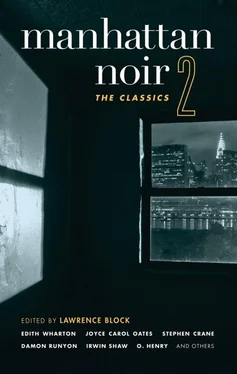Simms hesitated. “The job counselor at the halfway house said I was supposed to give that to Charlie Hosey.”
“I don’t care what the job counselor at the halfway house told you, bud. I’m in charge of these premises, not him. I want to see your assignment paper — now.” He held out a thick hand. Simms gave him the folded paper he wanted. Wallace’s laser eyes flicked over it. “General maintenance man,” he read, and grunted contemptuously. He tossed the paper back to Simms. “What’d you serve time for, Simms?” he asked, leaning forward, his words almost a challenge.
“You’re not allowed to ask me that,” Simms told him.
Wallace’s eyes flashed anger, but just for an instant. He sat back. “They tell you that at the halfway house ?” he asked.
“Yes.” Simms wished he had a drink of water.
“Then I guess you also know that I can’t ask where you did your time, or even how much time you did — that right?”
“Yes. Right.”
“Well, since I’m not allowed to know anything about you , I’m going to tell you a few things about me. First of all, understand one thing: I’m in charge of every thing and every body inside these premises. The Algiers is a city welfare hotel. There are nearly three hundred indigent families living here, many of them just women with young children.” Wallace tilted his head with a coyness surprising for his size. “I guess you been away from women for quite a spell, haven’t you?”
Simms didn’t say anything. Wallace’s eyes narrowed. “Couldn’t be that you were away for rape, could it, Simms? I mean, it would be just like those halfway-house fools to put a rapist in a building full of women to try to prove he’s been re-ha-bil-i-tated. Is that it, Simms? You a rapo?”
“I told you, you’re not allowed to—”
“I heard you the first time.” Wallace pointed a threatening finger. “Every woman in this building is under my protection, Simms. I catch you out of line with any of them, you even look down one of their blouses when they bend over, and I’ll have your ass back in the slammer so quick you’ll think you never got out. Understand me?”
“I understand,” Simms said quietly. He was relieved when Wallace looked away long enough to pick up the phone and dial two digits.
“Charlie, this is Max,” he said. “Come to my office and get your new helper.” When he hung up, he sat far back in his swivel chair, the springs squeaking with his weight, and carefully unwrapped a large black cigar that could have been designed with him in mind. Lighting it with an old-fashioned flip-top Zippo, he released several puffs of pungent smoke into the close little office. As he removed the cigar from his teeth, he actually smiled.
“Maybe I misjudged you, Simms,” he said almost pleasantly. “Maybe you’re not a rapo, after all.” His smile, there for mere seconds, vanished and his voice turned harsh again. “Maybe you’re a child molester. A pervert. Is that what you are, Simms?”
George Simms didn’t have to worry about answering that one, because at that moment Charlie Hosey walked in.
“I can really use you,” Hosey said as he showed Simms around the hotel. He was an older, short, balding man with a vague whiskey smell about him. “It ain’t bad keeping up with the big stuff — the boiler, the hot-water heaters, the electrical system. It’s the little stuff that runs me ragged. The minor plumbing repairs, jammed locks, hotplates shorted out, lighting fixtures that don’t work. You can handle all that kinda stuff, can’t you?”
“Sure,” Simms said. “Those are the same problems I used to take care of in the cellhouse. Except for jammed locks, that is — I wasn’t allowed to mess with locks.”
“I guess not,” Hosey said.
“Did you come here through the halfway house, too?” Simms asked.
“Me? No. I used to work here when the Algiers was a real hotel. I was maintenance superintendent when the place closed down. After that, I went to St. Luke’s Hospital for a few years. Then when I seen in the paper where the city was gonna lease the Algiers as a welfare hotel, I went and seen about coming back. They was glad to get me. Keeping this place going is like working in a secondhand tire shop — it’s patch, patch, patch all the time.”
They paused at the chained doors. “That’s the Moroccan Ballroom,” Hosey said. “The Duke and Duchess of Windsor used to throw parties in there. I seen ’em. It’s got picnic tables in it now — the Help for the Homeless people come in twice a day and serve free meals. Over here—” the little man led Simms across the lobby to a pair of locked leather-padded doors “—is the Casablanca Club. It used to be a real ritzy nightclub. All the big show people used to perform in there: Jolson, Helen Morgan, Blossom Seeley and Bennie Fields, Ruth Etting. I seen ’em.” He sighed wistfully. “Yeah, this place used to be something.”
They rode a service elevator, which Hosey had to unlock, down to the boiler room in the basement. On the way down, Simms asked, “What’s with this guy Wallace, anyway? He comes on like a concentration-camp guard.”
“Ex-cop,” Hosey said. “Takes his job real serious.” After a beat to think it over, he added, “I guess I ought to tell you — Max don’t much like the halfway house sending guys to work here. You’re the third one they sent. The other two didn’t last long. Max, he don’t give a guy much slack. He particularly don’t like nobody messing around with one of the young women that lives here.” Hosey shrugged. “I ain’t telling you what to do, understand — but you asked and I thought you should know.”
“Thanks,” said Simms. “I appreciate it.”
Off the big boiler room was the maintenance office: a badly scarred wooden desk littered with papers and miscellaneous junk in front of a padded chair that had a patch repaired with black electrical tape. A wooden straight chair stood in front of the desk, an old metal file-cabinet next to it. A pinup-girl calendar from a plumbing-supply company was thumbtacked to the wall. At the back of the office was a curtained doorway leading to a small storeroom. The curtain wasn’t closed all the way and Simms caught a glimpse of a cot in the room.
“Here’s where I list all the minor repairs to be done,” Hosey said, showing Simms a clipboard hanging on a nail. “Every day you just go down the list and do as many of ’em as you can. I ain’t gonna dog you as long as you do a reasonable amount of work. I know alls you’re getting is minimum wage for now. But if you work out and want a permanent job when you’re released from the halfway house, we can talk about it.”
“I’ll do a good job for you, Mr. Hosey,” Simms told him.
“Just call me Charlie,” said the little man.
A week later, Simms was sitting on the fire stairs at the end of the seventh-floor corridor having a smoke and drinking coffee from a small thermos he’d bought. His toolbelt and the clipboard of job orders lay on the step next to him. He had been sitting there for nearly an hour when the door to Room 704 opened and a little Puerto Rican girl, five or six years old, came out into the corridor to play. Pretty, clay-colored, with raven hair, she had on jeans and a sweater and carried a doll that was missing a hand. Sitting on the worn carpet with her back to the wall, she propped up her knees, sat the doll on them, and began to braid the doll’s hair.
Simms watched her for a couple of minutes, then leaned forward a little and spoke to her. “Hello.” He said it very quietly so as not to frighten her.
She looked at him but didn’t speak back.
“My name’s George,” he said. “I work here.” He showed her the toolbelt. “See?” The little girl looked, then turned her attention back to the doll. “That sure is a pretty doll,” Simms said. “But what happened to her hand?”
Читать дальше












